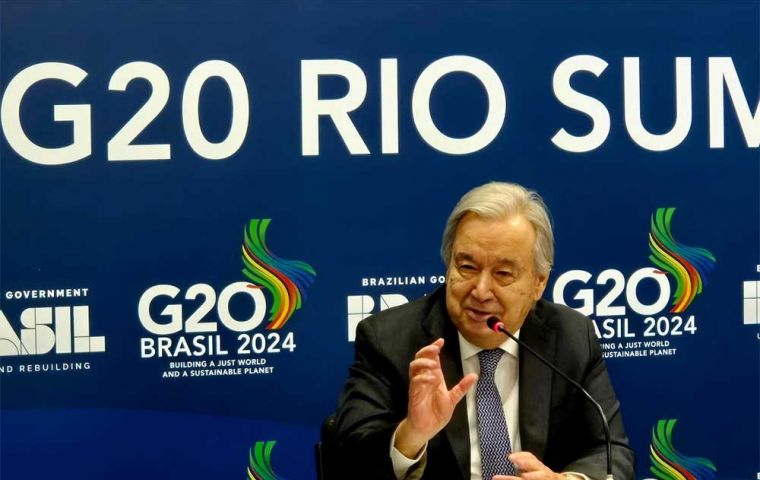MercoPress. South Atlantic News Agency
Guterres says “spirit of consensus” needed
 There were fears that a future US administration under Trump would follow Milei's steps
There were fears that a future US administration under Trump would follow Milei's steps United Nations (UN) Secretary-General António Guterres addressed the “Argentine case” ahead of the two-day G20 Summit starting in Rio de Janeiro Tuesday and called for a “spirit of consensus” to move forward.
The Portuguese diplomat made these remarks when asked about Argentine President Javier Milei opposing multilateralism and climate agreements. In addition, the South American country was recently the only one to vote against a UN resolution condemning violence against women and girls. Argentina is a G20 member.
“The 2030 Agenda had the consensus of all the countries of the world and is the clear path to face the tremendous inequalities and injustice that exist in the world. And, therefore, I make this appeal to all countries, now that the G20 negotiations are underway, to have a spirit of consensus, to show good sense, and to find the possibilities of transforming this G20 meeting into a success, with decisions that are relevant to the international order. If the G20 is divided, it loses importance at the global level. And, from my point of view, this is undesirable for a world that already has so many geopolitical divisions,” Guterres underlined amid fears that US President-elect Donald Trump, who shares Milei's views, might lure other countries to follow suit.
The UN Chief also said that the best way for the world to prepare the Trump's second administration is to maintain and strengthen global dialogue. “The main thing is to recognize the importance of multilateralism and institutions. If countries do that at the level of the United Nations, at the level of international laws, and adopt a minimum dialogue, and if they are skilled in all these areas to make a strong fight in favor of multilateralism, that is the best possibility of response,” he stressed from the Rio G20 press center, Agencia Brasil reported.
Regarding the world's climate challenges, Guterres noted: “I am coming from COP 29, in Baku, Azerbaijan. In this meeting, I have seen and heard concerns about the climate crisis. The year 2024 should be the hottest year in history. We see the impacts everywhere. And we don't need to go far. The drought in the Amazon and the floods in the South of Brazil are convincing examples of this.”
“Now it is time for the largest economies to lead by example. Failure is not an option. There are many challenges, but there are also many possible solutions. This is crucial to restore confidence and legitimacy to the global system,” he added.
“It is obvious that the United States is important to contain the climate crisis. However, the United States is a federal country and a market economy. And all the signals from the market today are to prioritize greener and cheaper sustainable energy production options. So I am confident that the dynamism of the American economy and American society will move in the direction of climate action, recognizing that the influence of governments today is much less than it has been in the past,” he went on.
Regarding the UN's Security Council, Guterres underlined that it was a body from “the world of 1945” which includes “no African or Latin American” permanent members, which does not fit “today's world.” It has also proven to be inefficient “due to political divisions.” In addition, “it has a legitimacy problem because it does not represent the reality of our times.” Therefore, “there is a need to reform” it “with the addition of new countries, especially from the Global South,” be them “permanent or not.”
In his view, “the Council's reform is one of the essential pillars of change so that we can have a fairer world.”
“On the Middle East, I believe that we cannot have dubious positions. We have to apply the same principles everywhere. We have to apply international law. And in the Middle East we need peace, but peace in a way that guarantees the rights of the Palestinians, as well as the rights of both Israelis, to have two states living in peace and security. And, at the same time, we need to address the immediate crisis. We can condemn the Hamas attack but recognize that they do not justify the collective suffering of the Palestinian people. We need an immediate cease-fire and provide effective humanitarian aid in Gaza,” Guterres also said.




Top Comments
Disclaimer & comment rules-

Read all commentshttps://www.youtube.com/watch?v=FVbpxa69eMQ
Nov 18th, 2024 - 11:44 am 0Commenting for this story is now closed.
If you have a Facebook account, become a fan and comment on our Facebook Page!